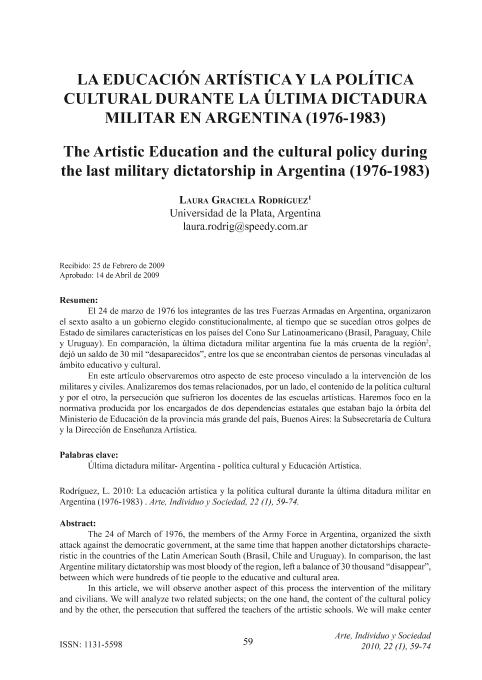Mostrar el registro sencillo del ítem
dc.contributor.author
Rodríguez, Laura Graciela

dc.date.available
2023-02-01T20:14:35Z
dc.date.issued
2010-02
dc.identifier.citation
Rodríguez, Laura Graciela; La Educación Artística y la política cultural durante la última dictadura militar en Argentina (1976-1983); Universidad Complutense de Madrid; Arte, Individuo y Sociedad; 22; 1; 2-2010; 59-74
dc.identifier.issn
1988-2408
dc.identifier.uri
http://hdl.handle.net/11336/186523
dc.description.abstract
El 24 de marzo de 1976 los integrantes de las tres Fuerzas Armadas en Argentina, organizaron el sexto asalto a un gobierno elegido constitucionalmente, al tiempo que se sucedían otros golpes de Estado de similares características en los países del Cono Sur Latinoamericano (Brasil, Paraguay, Chile y Uruguay). En comparación, la última dictadura militar argentina fue la más cruenta de la región2, dejó un saldo de 30 mil “desaparecidos”, entre los que se encontraban cientos de personas vinculadas al ámbito educativo y cultural. En este artículo observaremos otro aspecto de este proceso vinculado a la intervención de los militares y civiles. Analizaremos dos temas relacionados, por un lado, el contenido de la política cultural y por el otro, la persecución que sufrieron los docentes de las escuelas artísticas. Haremos foco en la normativa producida por los encargados de dos dependencias estatales que estaban bajo la órbita del Ministerio de Educación de la provincia más grande del país, Buenos Aires: la Subsecretaría de Cultura y la Dirección de Enseñanza Artística.
dc.description.abstract
The 24 of March of 1976, the members of the Army Force in Argentina, organized the sixth attack against the democratic government, at the same time that happen another dictatorships characteristic in the countries of the Latin American South (Brasil, Chile and Uruguay). In comparison, the last Argentine military dictatorship was most bloody of the region, left a balance of 30 thousand “disappear”, between which were hundreds of tie people to the educative and cultural area. In this article, we will observe another aspect of this process the intervention of the military and civilians. We will analyze two related subjects; on the one hand, the content of the cultural policy and by the other, the persecution that suffered the teachers of the artistic schools. We will make center in the norm produced by the functionaries of two state dependencies that were under the orbit of the Ministry of Education of the greatest province of the country, Buenos Aires: the Undersecretary’s office of Culture and the Direction of Artistic Education.
dc.format
application/pdf
dc.language.iso
spa
dc.publisher
Universidad Complutense de Madrid

dc.rights
info:eu-repo/semantics/openAccess
dc.rights.uri
https://creativecommons.org/licenses/by/2.5/ar/
dc.subject
ARTE
dc.subject
ENSEÑANZA
dc.subject
ESCUELAS
dc.subject
PROVINCIA BUENOS AIRES
dc.subject.classification
Educación General

dc.subject.classification
Ciencias de la Educación

dc.subject.classification
CIENCIAS SOCIALES

dc.title
La Educación Artística y la política cultural durante la última dictadura militar en Argentina (1976-1983)
dc.title
The Artistic Education and the cultural policy during the last military dictatorship in Argentina (1976-1983)
dc.type
info:eu-repo/semantics/article
dc.type
info:ar-repo/semantics/artículo
dc.type
info:eu-repo/semantics/publishedVersion
dc.date.updated
2023-01-31T17:41:30Z
dc.journal.volume
22
dc.journal.number
1
dc.journal.pagination
59-74
dc.journal.pais
España

dc.journal.ciudad
Madrid
dc.description.fil
Fil: Rodríguez, Laura Graciela. Consejo Nacional de Investigaciones Científicas y Técnicas; Argentina. Universidad Nacional de La Plata; Argentina
dc.journal.title
Arte, Individuo y Sociedad
dc.relation.alternativeid
info:eu-repo/semantics/altIdentifier/url/https://revistas.ucm.es/index.php/ARIS/article/view/ARIS1010110059A/0
Archivos asociados
